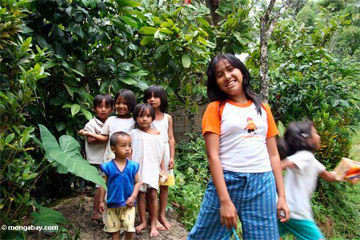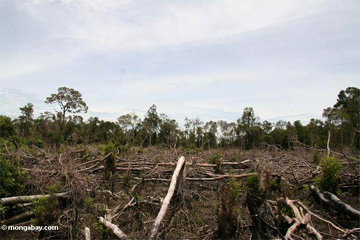The following is a text of a Call for Action issued after the First Regional Forum for People and Forests: Carbon Financing and Community Forestry. The three-day event brought together key people to analyze the risks, opportunities, and constraints that carbon financing presents for Asia-Pacific’s forest-dependent people.
Deforestation and forest degradation contribute some 20 percent of global greenhouse
gas emissions. Forest-related mitigation measures are now recognized to be amongst
the most practical and cost-effective interventions to slow global warming – as well as
providing a host of other environmental products and services.
However, rural poverty, weak law enforcement, and escalating demand for food and
fuel continue to drive forest destruction at an alarming rate – in the Asia-Pacific region
alone, some 3.7 million hectares of natural forest are lost every year. This also threatens
millions of already vulnerable rural livelihoods, often undermining traditional rights to
vital forest resources.
Carbon financing may provide promising new opportunities for maintaining and even
improving the health of the world’s forests and, if designed well, to reduce rural poverty.
But if schemes such as ‘REDD’ fail to deliver tangible benefits to Asia-Pacific’s 450 million
forest-dependent people, then the social and economic impacts could be severe.

|
Ultimately, this increases the risk that forest-related mitigation efforts will fail.
Key country decision-makers and over 80 participants from 12 Asia-Pacific nations
considered these issues at the First Regional Forum for People and Forests: Carbon
Financing and Community Forestry, held in Hanoi, Vietnam, from 18 to 20 August 2009.
As forests in the Asia-Pacific region can potentially absorb a large proportion of global
carbon dioxide emissions, the need for healthy and sustainable forest ecosystems cannot
be understated nor undersold. But we must go beyond carbon to promote and ‘sell’
biodiversity, watershed conservation, and sustainable forest management as an essential
holistic package.
Local people hold the key to healthy forests in this region. They have the closest direct
stake in forest resources and will affect the outcome of any forest management strategy,
including those aimed at climate change mitigation. For carbon financing to succeed,
it must learn from three decades of community forestry experience and actively engage
and benefit local people.
Lessons from payment for environmental service (PES) schemes reveal that carbon
financing presents both risks and opportunities for local people, and also constraints to
their effective participation. Maximizing the opportunities and addressing the risks and
constraints requires early and active community involvement, especially in negotiating
roles, responsibilities, and benefits.
 Deforestation for a new oil palm plantation in Kalimantan (Indonesian Borneo). |
Benefits from carbon financing must be additional and expand, not replace, local
people’s existing rights and benefits. Strong grassroots institutions and clear, secure,
and fair rights to forests are critical prerequisites. Meaningful local participation, shared
decision making, and high levels of transparency and accountability must be regarded
as the ‘minimum standard.’
Intermediary organizations that will build capacity and help broker carbon financing
agreements have key roles to play in securing equity and local participation, and will
require support in carrying out these important functions.
However, until carbon ownership, benefit-sharing arrangements, financing methods
and legal issues are clarified, carbon markets will remain a risky area of investment for
both the private sector and local people.
In considering the implications of carbon financing for local people, Forum participants
called for:
National Governments to:
- Ensure community interests are represented during multi-stakeholder discussions
involving civil society, NGOs, UNFCCC delegates, and other key stakeholders. - Make the national position on forests and carbon financing clear and transparent,
including engaging media to raise public understanding and stimulate debate. - Use regional mechanisms to develop consensus among countries (e.g. ASEAN,
SAARC) before the AWG-LCA meets in Bangkok.2 - Accelerate the process of clarifying fair and secure rights for local people to benefit
from forests. - Increase community, government, and intermediary capacity to design and
implement REDD mechanisms. - Establish cost-effective, transparent, equitable, and ‘community-friendly’ carbon
payment systems.
International Organizations to: - Target key information – including the outcomes of this Forum – to media and
national decision makers, including UNFCCC delegates. - Provide a bridge between civil society groups in developing countries and
UNFCCC delegates from developed countries, making them aware of the
implications of carbon financing for local people in Asia-Pacific. - Seek to influence country positions, both developing and developed, to ensure
that community interests are fully considered and addressed. - Generate objective knowledge to inform policymaking and implementation,
and build capacity to research, analyze, disseminate, and use knowledge
effectively at country level. - Strengthen South-South cooperation for capacity building and information sharing
on matters of forests and climate change. - Encourage both developed and developing country governments to fulfill their
commitments and obligations to support REDD-readiness in developing countries.
Civil Society to:
- Facilitate national and subnational civil society consultations, working closely with
national governments to prepare for the COP-15 negotiations and beyond. - Mobilize key groups with special interests and skills – including religious organizations
and academia – as strategic partners to influence the debate. - Review the negotiating text for future climate change arrangements, providing
timely and constructive feedback promoting community interests.
Private Sector to: - Maximize transparency in forestry and carbon-financing arrangements to build trust
among stakeholders. - Adopt clearly defined social responsibility roles, particularly promoting the concept
of more socially responsible carbon trading.
The First Regional Forum for People and Forests brought together
key people from government, civil society, the private sector, and
international organizations to discuss options for strengthening
the forest carbon-community connection in the Asia-Pacific region.
The Forum reached consensus on the importance of engaging
communities in any sustainable carbon financing initiatives, and
explored ways to achieve this.
Key Questions Included:
- What benefits could communities gain from carbon-financing
schemes? - What are the potential pitfalls and risks?
- How can carbon markets strengthen sustainable forest
management regimes in ways that meet rural communities’
needs and fairly reward their contributions?
Organizers: RECOFTC – The Center for People and Forests, the
FAO Regional Office for Asia and the Pacific, and the Forest
Sector Support Partnership of Vietnam’s Ministry of Agriculture
and Rural Development.
The full report is available by contacting RECOFTC
Related Articles
Companies benefit from reducing conflict with local people

(07/08/2009) Mechanisms to mitigate disputes with local communities, can reduce risk for companies seeking to profit from forest use while at the same time helping protect rights of forest people, argues a new report published today by the The Forests Dialogue (TFD), an international group of forest experts from business, environmental, academic and human rights groups.
A New Idea to Save Tropical Forests Takes Flight

(06/29/2009) Every year, tens of millions of acres of tropical forests are destroyed. This is the most destabilizing human land-use phenomenon on Earth. Tropical forests store more aboveground carbon than any other biome. They harbor more species than all other ecosystems combined. Tropical forests modulate global water, air, and nutrient cycles. They influence planetary energy flows and global weather patterns. Tropical forests provide livelihoods for many of the world’s poorest and marginalized people. Drugs for cancer, malaria, glaucoma, and leukemia are derived from rainforest compounds. Despite all these immense values, tropical forests are vanishing faster than any other natural system. No other threat to human welfare has been so clearly documented and simultaneously left unchecked. Since the 1992 Rio Earth Summit (when more than 100 heads of State gathered to pledge a green future) 500 million acres of tropical forests have been cut or burned. For decades, tropical deforestation has been the No. 1 cause of species extinctions and the No. 2 cause of human greenhouse gas emissions, after the burning of fossil fuels. For decades, a few conservation heroes tried their best to plug holes in the dikes, but by and large the most diverse forests on Earth were in serious decline.
Indigenous people, forest communities in Africa control less than 2% of forest land
(05/28/2009) Less than 2 percent of Africa’s tropical forests are under community control, hindering efforts to slow deforestation and alleviate rural poverty, reports a new assessment from the International Tropical Timber Organization (ITTO) and the Rights and Resources Initiative (RRI), a global coalition of non-governmental and community organizations.
Indigenous people serve as guardians of forest carbon, must be involved in climate solutions
(04/22/2009) Efforts to create an international climate framework — including a carbon financing mechanism for forest conservation — must involve forest people, said indigenous leaders attending the Indigenous Peoples Global Summit on Climate Change meeting this week in Anchorage, Alaska.
Guidelines on how to establish an avoided deforestation project
(01/22/2009) Deforestation presently accounts for nearly 20 percent of anthropogenic greenhouse gas emissions — a share larger than that from the global transportation sector. Given this contribution, reducing deforestation is widely seen as a key component in plans to slow climate change and a number of proposals to include forestry in a post-Kyoto climate agreement are presently on the table. Anticipating the emergence of a market for forest carbon as a result of this framework, ‘avoided deforestation’ projects are already sprouting up in tropical countries around the world. Supporters say these initiatives offer the potential to protect forests and biodiversity while simultaneously delivering benefits to rural communities that have so far been lost out while their natural resources have been plundered by developers. While avoided deforestation seems to offers great promise, developing a project that meets still emerging standards is a complex and costly endeavor. A new book, published in five languages, seeks to untangle the forest carbon market and thereby facilitate new avoided deforestation projects.
REDD may harm forest people, alleges report
(12/02/2008) A new report finds that the World Bank is not doing enough to protect indigenous rights under its mechanism to reduce emissions from deforestation and forest degradation (REDD).
Carbon conservation schemes will fail without forest people
(10/16/2008) Mechanisms that use forest conservation to reduce greenhouse gas emissions are doomed to fail unless they are “based on respect for the rights of indigenous peoples and forest communities,” warn environmentalists and indigenous rights groups meeting in Oslo this week. Indigenous groups fear they are being excluded from discussions on Reduced Emissions from Deforestation and Forest Degradation (REDD), a proposed financial mechanism that would compensate tropical countries for reducing emissions caused by deforestation and land use. Such emissions account for a fifth of the global total, or more than the total emissions from transportation. In particular, indigenous groups and forest communities are concerned they will not see benefits from REDD. Worse, some believe the mechanism could trigger a new wave of land grabs and evictions by parties seeking to capitalize on carbon payments. Indigenous groups and forest communities have long struggled against development interests seeking to exploit their traditional lands and resources. But supporters of so-called “avoided deforestation” schemes say that properly-designed policy offers unprecedented opportunities to create sustainable livelihoods for forest people while safeguarding biodiversity and services provided by healthy forest ecosystems.
Forest conservation can fight climate change and poverty
(10/08/2008) The Forests Dialogue — a coalition consisting of more than 250 representatives of governments, forestry companies, trade unions, environmental and social groups, international organizations, forest owners, indigenous peoples and forest-community groups — has issued guiding principles for including forests in climate change negotiations.
Indigenous people demand greater say in using forests to fight global warming
(10/08/2008) Indigenous leaders renewed their call for greater say in how tropical forests are managed to reduce greenhouse gas emissions, according to AFP.
Cutting deforestation can fight climate change, reduce poverty and conflict
(09/24/2008) Forest conservation can play a critical role in efforts to reduce greenhouse gas emissions and alleviate poverty, said a prominent group of politicians, development experts, and environmental NGOs meeting in New York City to discuss U.S. climate policy. Organized by Avoided Deforestation Partners, an international policy group, the meeting sought to establish a strategy to highlight the global impact of deforestation and push for the inclusion of tropical forests in domestic climate policy. Attendees included leaders of WWF, the Nature Conservancy, Conservation International, World Vision, Oxfam, Mercy Corps, Care International, and the Union of Concerned Scientists; former Vice President Al Gore; Wangari Maathai, a Nobel Prize-winning activist from Kenya; Bharrat Jagdeo, president of the South American country of Guyana; and executives from a number of carbon-trading and financial firms. The event was hosted by veteran journalist Dan Rather.
Communities must benefit for forest carbon schemes to be effective
(12/13/2007) Much has been promised by what avoided deforestation carbon credits can do to support forest protection, increase tax revenues, and develop sustainable rural economies in our Zamrud Khatulistiwa or Emerald on the Equator.







